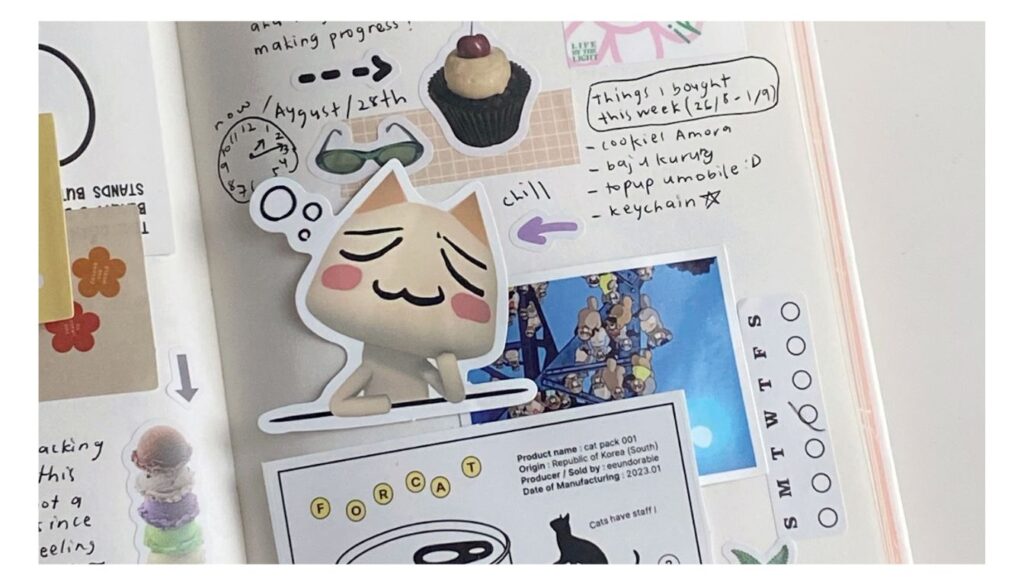Journaling is a great way to grow and improve yourself. It helps us think about our thoughts, feelings, and experiences. This way, we can understand our goals and dreams better.
Using self-reflection questions in our journals can change our lives. They help us manage our emotions, recognize our thoughts, and stay positive. By answering these prompts, we learn more about ourselves and act in line with our values.
Studies show that journaling is good for us. A 2018 study found that, for 15 minutes, three times a week, writing about good experiences can reduce anxiety and stress. It’s a simple way to track our growth.
Writing can also serve as a means to release stress and express ourselves in a safe manner. Through journaling, we can explore different parts of ourselves. It’s a private way to dive into our thoughts and feelings.
Table of Contents
Understanding the historical significance of journaling.
Journaling has a long history, dating back centuries. Ancient civilizations used writing to share their thoughts and experiences. Today, journaling is a key tool for personal growth and self-discovery.
Famous Historical Figures Who Journaled
Many famous people have used journals to express themselves. Leonardo da Vinci filled notebooks with sketches and notes. Frida Kahlo’s journals showed her artistic journey and inner thoughts.

Evolution of Journaling Through Time
Journaling has changed a lot over time. It’s moved from simple record-keeping to a focus on self-awareness. Now, journals help with personal growth and self-discovery.
Different Types of Journaling Practices
There are many ways to journal, each with its own purpose. Some write without restraint, while others use prompts for self-discovery. Gratitude journals help you appreciate life, and dream journals explore your subconscious.
“Journaling is like whispering to oneself and listening at the same time.” – Mina Murray
Journaling’s history shows its lasting impact on personal growth. New or experienced, trying different journaling techniques can boost self-awareness and personal growth.
25 Powerful Journal Prompts for Self-Discovery
Core Values and Identity
- What are my top three core values, and how do I live them daily?
- What do I love most about myself?
- What is one lesson from my past that I am grateful for?
- What does self-love mean to me, and how do I practice it?
- Who are the people I feel most connected to, and why?
Dreams and Aspirations
- If I had no fear of failure, what would I pursue right now?
- What does my dream life look like in five years?
- What is one childhood dream I still hold close to my heart?
- What would I do if I trusted myself fully?
- What opportunities have I been hesitant to take, and why?
Growth and Challenges
- What inspires me to keep going on tough days?
- What limiting beliefs are holding me back, and how can I reframe them?
- How do I handle challenges, and how can I improve?
- What anchors me when I feel overwhelmed or lost?
- What do I want to explore about myself that I’ve been avoiding?
Relationships and Connections
- How do I express myself authentically in my relationships?
- Who are the people I feel most connected to, and why?
- What advice would I give to my younger self?
- What boundaries do I need to set to protect my energy?
Creativity and Inspiration
- When was the last time I felt truly creative or inspired?
- What books, movies, or songs have deeply impacted me?
- What is one thing I can do to feel more present in my daily life?
- How do I connect with nature, and how does it make me feel?
Habits and Daily Life
- What memories bring me the most joy, and why?
- What memories bring me the most joy, and why?
The Science Behind Journal Prompts for Self-Discovery
Scientists back journal prompts for self-discovery. They support our personal growth and enhance our mental well-being. Let’s explore the science behind this practice.
Research-Backed Benefits of Journaling
Research shows that journaling has many benefits. The New York Times says it can improve sleep and boost self-acceptance. It also strengthens our immune system.
UConn’s Center for Excellence in Teaching and Learning says that journal prompts engage and focus students.

Psychological Impact on Personal Growth
Mindfulness journal prompts are key to personal growth. They help us spot and change negative thoughts. This way, we become more aware of ourselves and make better decisions.
How Journaling Affects Mental Well-Being
Journaling is a private space for reflection. It helps us understand our feelings and thoughts. This boosts our emotional strength.
Many successful people, like Oprah Winfrey, use journaling for self-discovery. They see it as a way to grow and understand themselves better.
“Journaling is like whispering to one’s self and listening at the same time.” – Mina Murray
To get the most from journaling, try these tips:
- Make journaling a regular part of your routine.
- Try a 30-day challenge with different prompts.
- Focus on topics that genuinely engage your interest.
- Reflect on the reasons behind your response to the question.
By using these journal prompts daily, we can grow and understand ourselves better.
Transformative Journal Prompts for Personal Growth
We’ve collected 9 powerful self-care journaling prompts to spark your personal growth. These prompts help you look at your past, present, and future. They aim to deepen your self-discovery and change.
Past Reflection Prompts
Looking back at your past can reveal important insights. Try these prompts to explore your childhood memories and life lessons:
- Describe a challenging experience and how it shaped you.
- Recall a moment when you felt a strong sense of confidence.
- Write about a mistake you made and the lesson you learned.
Present Awareness Prompts
Journaling helps you understand your current state. Use these prompts to look at your feelings and values:
- List three things you’re grateful for today.
- Recognize a self-limiting belief and transform it into a positive statement.
- Describe your ideal self-care routine.
Future Vision Prompts
Thinking about your future can guide your growth. Try these prompts to clarify your goals and dreams:
- Write about your dream life five years from now.
- List three steps to achieve a long-term goal.
- Describe a fear you want to overcome and why.
Remember, there’s no right or wrong way to use these prompts. Pick the ones that speak to you and take your time. Happy journaling!
Essential Elements of Starting Your Self-Discovery Journal
Starting a self-discovery journal can be a powerful way to explore your inner world. Self-awareness exercises and therapeutic journaling topics can help break down mental barriers. They connect you with your authentic self.

Breaking Through Mental Barriers
Many people struggle with getting started. It’s normal to feel hesitant or unsure. Try these self-exploration journal ideas to overcome writer’s block:
- Write about your day for five minutes without stopping.
- Describe a recent dream in detail.
- List 10 things you’re grateful for right now.
Connecting with Your Authentic Self
Journaling allows you to tap into your true thoughts and feelings. Use these prompts to dig deeper:
- What values are most important to you?
- Recall a moment when you experienced a deep sense of vitality.
- What would you do if you knew you couldn’t fail?
Processing Emotions and Experiences
Your journal is a safe space to explore difficult emotions. Try these therapeutic journaling topics:
- Write a letter to your younger self.
- Describe a challenging situation and how you overcame it.
- Explore an emotion you are currently experiencing.
Remember, there’s no right or wrong way to journal. The key is consistency. Start with short sessions and build up over time. Your self-discovery journey awaits!
Creating a sustainable journaling practice
Starting personal growth journaling is exciting, but keeping it up can be tough. To stay on track, set achievable goals and create a routine. Choose a time and spot that suit you, like early mornings or before bed.
Try out different journaling methods to find what works best for you. Some like traditional paper and pen, while others prefer digital tools. It’s all about finding what feels right.
To keep journaling a habit, link it to something you already do or set reminders. It’s okay if you miss a day sometimes. Frequent reviews of your journal can help you see how far you’ve come.
Using self-care journal prompts can provide significant support when you’re stuck. They guide you and encourage deeper thinking. Here are some prompts to start with:
- What made me smile today?
- How can I show myself kindness right now?
- What’s one thing I’m proud of this week?
Mindfulness journal prompts can also boost your practice. They help you stay present. Try these:
- What sensations do I notice in my body right now?
- Describe three things I can see, hear, and feel in this moment.
- What emotions am I experiencing, and where do they come from?
Remember, journaling is about growth and self-discovery. Be patient, stay curious, and let your journal be a safe space for your thoughts and feelings.
Maximizing Your Journaling Experience for Deep Self-Discovery
Journaling is an effective method for personal growth. To get the most out of it, setting up the right space is key. Let’s look at how to improve your journaling.
Setting the Right Environment
Look for a quiet, comfy spot to think. It could be a cozy corner at home or a calm outdoor place. The right spot helps you focus on self-discovery journal questions without distractions.
Choosing Your Preferred Medium
Try out different journaling methods to see what suits you best. Some like writing with a pen and paper, while others prefer digital apps. Find what makes you want to write more about introspective topics.
Establishing Consistent Habits
Being regular with journaling is important. Pick a time each day for it. It could be morning to reflect or evening to think about the day. Consistent writing can lead to deep insights and growth.
Remember, the aim is to make journaling a routine that feels good to you. Set up the right space. Choose your favorite way to write. Stick to a routine. This will boost your journey of self-discovery through journaling.
Conclusion
We’ve seen how journal prompts can change our lives. People like Oprah Winfrey have found great benefits in them. Writing and reflecting can reveal our talents. They can help us deal with feelings and clarify our goals.
Our exploration of 100 deep journal prompts has shown us how to find our inner wisdom. These questions help us spot what holds us back, see how far we’ve come, and dream about our future. Journaling lets us explore our past and set big goals in a safe way.
To journal well, be regular and create a good space. Find a quiet place, choose your favorite pen, and let your thoughts come out. It will help us know ourselves, reduce stress, and live with more purpose. So, let’s pick 3-5 prompts and start our self-discovery journey today!
FAQS
How can journaling help with personal growth?
Journaling helps you grow by making you reflect on your thoughts and experiences. It helps you see patterns in your behavior and understand your goals and values.
What are some effective journal prompts for self-reflection?
Good prompts for self-reflection often look at your past, present, and future. Examples include: “What life experiences have shaped me?”; “What are my core values?”; and “Where do I see myself in five years?””
Can journaling help with mental health?
Yes, journaling can provide significant benefits for your mental health. It can reduce stress and help with depression and anxiety.
How can I make my journaling practice more consistent?
To journal more, set a specific time and place. Link it to a habit, use reminders, and be flexible if you miss a day. Find a routine that fits your life and preferences.

